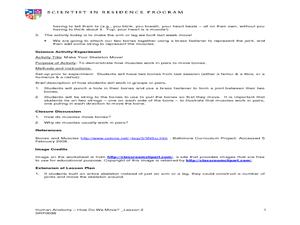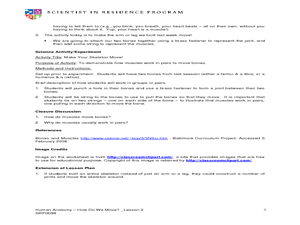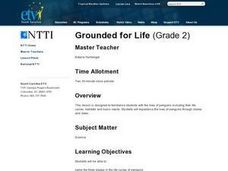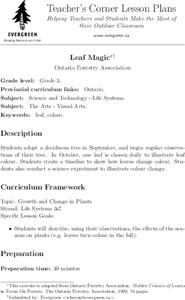Curated OER
Elaine Humphrey, Gwynne Thompson
Second graders become familiar with the parts of the microscope and how it works. In this microscope activity, 2nd graders experiment with different light and settings. Students answer questions based on their experiment.
Curated OER
Layers of the Forest- Leaf Litter
Students conduct an experiment. In this temperate forest instructional activity, students discuss what kind of animal life can be found in the forest. They read The Magic School Bus Meets the Rot Squad: A Book About Decomposition and...
Curated OER
Human Anatomy - How Do We Move?
Fifth graders discover how blood moves around the body. In this circulatory system lesson, 5th graders feel their pulse before and after exercise. Students count their heart rate. Students use the scientific method to record...
Curated OER
fun with Plants that We Use
Students become familiar with the products made from various plants. In this plants lesson, students experiment with natural dyes from plants. Students complete a list of things made from plants. Students answer...
Curated OER
Forest Ecosystem
Students take a field trip and explore a temperate rainforest. In this rainforest lesson plan, students discuss many items they see on their journey and experiment with different tree leaves.
Curated OER
Measurement of Biotic and Abiotic Objects
Students identify biotic and abiotic factors. In this environmental study lesson, students conduct a series of experiments to collect and record data and draw conclusions based on the results.
Curated OER
Human Anatomy- How Do We Move?
Learners explore the human anatomy. In this respiratory system lesson, students conduct an experiment to simulate the capacity of human lungs.
Curated OER
Human Anatomy -- How Do We Move?
Students create a model of the digestive system. In this human anatomy instructional activity the students examine features of the digestive system. The students perform an experiment.
Curated OER
Flight of the Painted Ladies
Students explore the life cycle of the Painted Lady Butterfly. They set up cameras near a butterfly culture. They create an iPhoto photo book to document and journal their observations of the metamorphosis. Students produce a narrated...
Curated OER
Refining the Why? Turning Student Questions into Research
Middle schoolers have years of experience when it comes to how their bodies work. Surely they have some questions as well. Here is an opportunity for them to practice the scientific method in an attempt to answer some of those questions....
Curated OER
In the Company of Wild Butterflies
Pupils discover the life cycle of a butterfly and explain the different stages. In this exploratory lesson students watch a video and create insect art and they will get an opportunity to view live specimens of butterflies.
Curated OER
Using Imagery To Introduce the Endocrine System
Students listen with closed eyes to a story that starts in a relaxed tone and ends in a scream. They list the body reactions they experience: fast heart rate, shaking, etc. and hypothesize the reason for the reactions. They explore the...
Curated OER
The Great Kapok Tree by Lynne Cherry
With The Great Kapok Tree, by Lynne Cherry as the hook learners discuss the rainforest, the animals that live there, and conservation efforts. Then, students write a letter to the man in the story asking him not to cut down the Kapok...
Curated OER
Now You See Me, Now You Don't
Bioluminescence fascinates most upper elementary scientists. Display images of different glowing deep-sea organisms and discuss their environment. Young biologists then experiment with images and different colors of filtered light. In...
Curated OER
Blubber Gloves
The ways that animals adapt to their environments is quite remarkable. In this life science lesson, fifth graders take a look at some of the ways that aquatic animals that live in Arctic or Antarctic waters survive. They perform an...
Curated OER
Do You See What I See?
Students engage in a instructional activity that differentiates between right and wrong types of observations. In order to conduct the experiment they are provided with leaves and nameless objects with different designs. The two are...
Oregon Museum of Science and Industry (OMSI)
DNA Extraction
What does your DNA actually look like? Use simple materials with this experiment to find out! Geneticists of all ages can follow these instructions to extract their own DNA. For learners who are hoping to extend the activity, there are...
Curated OER
Grounded for Life
Second graders become familiar with the lives of penguins including their life cycles, habitats and basic needs. Students will experience the lives of penguins through stories and video.
Curated OER
Classroom Science Fair Project
Students explore the skills and information needed to complete a science fair project. They follow guidelines to create an document their science fair project.
Curated OER
DNA Extraction Laboratory Experiment
Students will visualize how DNA is extracted from cells by performing a simple laboratory experiment. They will then use this knowledge to further understand how scientists are using DNA extraction to try to clone human cells, and to...
Curated OER
Experiment on Minimal Segment Size Regeneration of Lumbriculus variegatus
The experiment allows students to observe regeneration of tailless and headless worm segments into complete individuals. Data of a completed experiment are included as well as a student activity sheet.
Curated OER
Science Unit Lesson Five
Sixth graders review how and which plants operate in terrariums. In groups, they follow instructions to make their own terrarium and place different types of plants in it. To end the lesson, they review the steps in the water cycle and...
Kenan Fellows
Sensors in Chemistry
The Environmental Protection Agency monitors sensors to track air pollution and set clean air standards. Enthusiastic young scientists use similar sensors to gather data in their area and then apply the gas laws and conservation of...
Curated OER
Leaf Magic
Third graders adopt a deciduous tree in September, and begin regular observations of their tree. They create a timeline to show how leaves change color and conduct a science experiment to illustrate color change.























